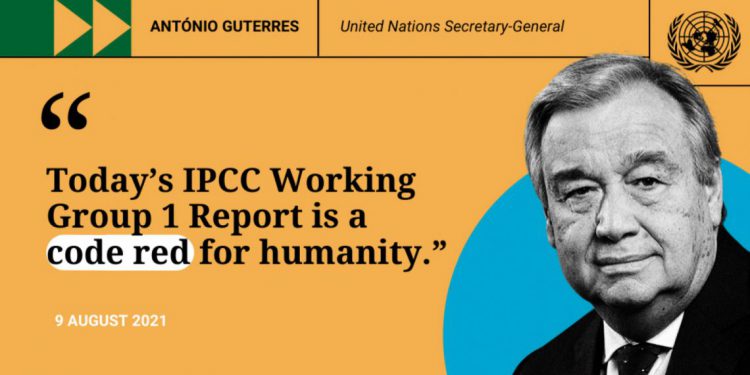A crucial UN climate change report says global warming of 2°C will be exceeded this century without rapid action. This level meets the critical tolerance thresholds for agriculture and health. Climate crisis poses enormous financial risk
The Intergovernmental Panel on Climate Change (IPCC) assessment is based on improved historical warming data, as well as better understanding of human-caused emissions. Climate crisis poses enormous financial risk
The UN Secretary-General António Guterres said the report was “a code red for humanity” and called for a minimum international carbon price to be set.
There are 60 national and subnational carbon pricing schemes around the world, but four-fifths of global emissions remain unpriced. The global average emissions price is just US$3 per ton. The International Monetary Fund has said a global carbon price of around US$75 per ton is needed.
António Guterres said, “The climate crisis poses enormous financial risk to investment managers, asset owners, and businesses.
“Every fraction of a degree counts. Greenhouse gas concentrations are at record levels”
“These risks should be measured, disclosed and mitigated. I am asking corporate leaders to support a minimum international carbon price and align their portfolios with the Paris Agreement.
“The public and private sector must work together to ensure a just and rapid transformation to a net zero global economy.
“Every fraction of a degree counts. Greenhouse gas concentrations are at record levels. Extreme weather and climate disasters are increasing in frequency and intensity. That is why this year’s United Nations climate conference in Glasgow is so important.
“We need immediate action on energy. Without deep carbon pollution cuts now, the 1.5-degree goal will fall quickly out of reach.
“This report must sound a death knell for coal and fossil fuels, before they destroy our planet. There must be no new coal plants built after 2021. OECD countries must phase out existing coal by 2030, with all others following suit by 2040.
“Renewable energy investments should triple to maintain a net zero trajectory by mid-century”
“Countries should also end all new fossil fuel exploration and production, and shift fossil fuel subsidies into renewable energy.
“By 2030, solar and wind capacity should quadruple and renewable energy investments should triple to maintain a net zero trajectory by mid-century.”
The report, prepared by 234 scientists from 66 countries, confirms that human influence has warmed the climate at a rate that is unprecedented in at least the last 2,000 years.
It shows that averaged over the next 20 years, global temperature is expected to reach or exceed 1.5°C of heating.
In 2019, atmospheric CO2 concentrations were higher than at any time in at least two million years, and concentrations of methane and nitrous oxide were higher than at any time in the last 800,000 years.
“Changes to the ocean affect those relying on its ecosystems”
Global surface temperature has increased faster since 1970 than in any other 50-year period over a least the last 2,000 years.
The global sea level has risen faster since 1900, than over any preceding century in at least the last 3,000 years.
Extreme sea level events that occurred once in 100 years could happen every year by the end of this century.
The report says further warming will amplify permafrost thawing, and the loss of seasonal snow cover. This will melt glaciers and ice sheets, and summer Arctic sea ice.
Changes to the ocean, including warming, more frequent marine heatwaves, ocean acidification, and reduced oxygen levels, affected those relying on its ecosystems.
António Guterres said “Inclusive and green economies are possible for all, if we respond with solidarity and courage.”























